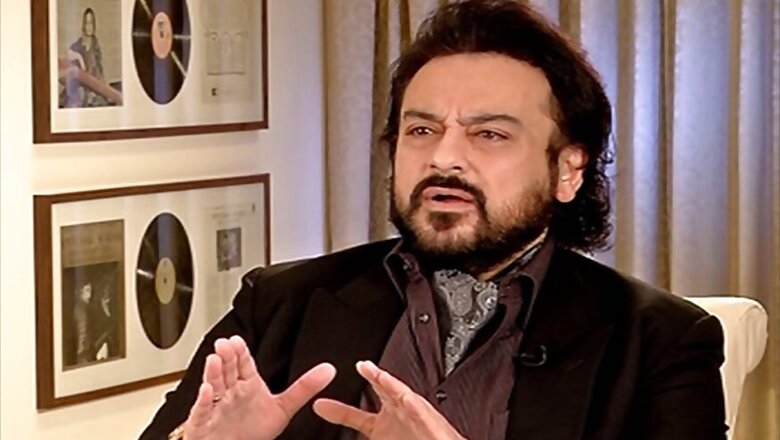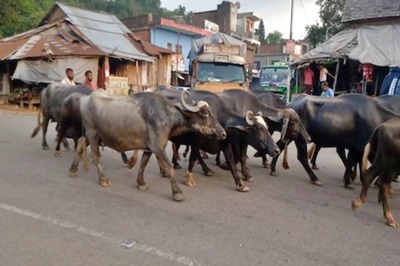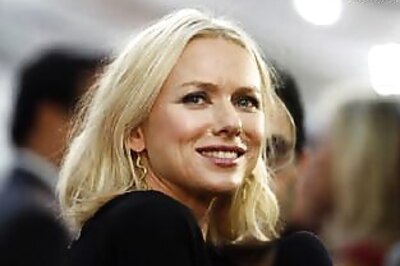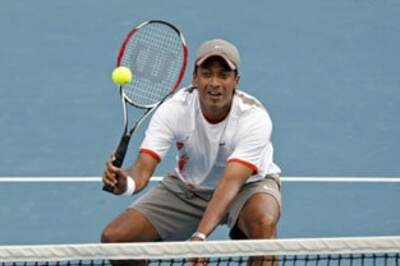
views
Eighteen years ago when Adnan Sami relocated from Pakistan to India, little did he know that he would become a phenomenon in a new country. This wasn't the country of his birth and neither that of his parents. It was the country of his choice. In a conversation with CNN-News18’s Marya Shakil, Sami talks about choosing to live in India, his music, his family, his weight loss, and much more.
Marya - Mr. Sami, thank you so much for your time and I must confess that I have been a huge fan of yours, loved your composition, love your voice and love your soul for music. I am glad that you could find time for me and for this interview. Let me begin by asking you, how has the transition been from Pakistan to India and a brief period of being stateless?
Adnan Sami - Well, you know, it has been a journey. I came in 1999 and I had no clue where this journey was going to take me. I took it as it came, and within a couple of years, I was in rapture with this overwhelming love I got from India. India fell in love with me, I fell in love with her even more. And, I just said to myself that this is that missing link I was waiting for, looking for all my life.
Marya - So, was this transition almost completely natural?
Adnan Sami - Yes, it was almost as if it was something I was in search of all my life, and I was constantly looking for it and then I found it. And it just felt perfect. Not only did my music find a beautiful home, but my soul also found a home. And the way people embraced me, I felt at home over here, more than anywhere else in my life.
Marya - Including Pakistan?
Adnan Sami - Including Pakistan, because the point was that here everyone... you know, over there, I had love, but it's also from the perspective that I come from a very privileged family. So, there was that whole element there and then okay, he's a musician too, you know those little bit of ‘why don't you continue being a lawyer’. I mean that is what I studied.
Marya - Lincoln's inn…
Adnan Sami - And now, it was like why music when you have come from such a different background, but you know that was my calling.
Marya - England discovered you.
Adnan Sami - Yes.
Marya - You thrived in UAE.
Adnan Sami - Right.
Marya - Why India?
Adnan Sami - Well, you know, it is very interesting because I spent most of my childhood, well my entire childhood abroad, but I spent most of it in England and I was doing a lot of recording in England. That's where I met Asha ji for the first time, Asha Bhosle ji.
So, we were recording an album which eventually became 'Kabhi to nazar milao' and she asked: Sami, where do you intend to release this? I said Asha ji, I will probably release this in England. And then she said to me, you know what, the capital of Hindi music is Mumbai. I said, of course. She said come to Mumbai and release it. And I said Asha ji, I don't know anybody. I don't know anybody over there. But she said just come, trust me, so it was basically her. She was the one who actually nudged me. So, I built up the courage and I actually came to Mumbai at that time. And then, before I knew it, the album got released and the rest is history.
Marya - Were you prepared for the kind of backlash that you got in Pakistan after you decided to take up Indian citizenship? Were you prepared for that because you were called a 'gaddar'? You were trolled as well.
Adnan Sami - Yeah, you know it's strange because many years earlier, even before I got my citizenship, there was a very popular rumour in Pakistan already that I have already become an Indian citizen. And to the point that a very interesting thing happened.
My father was alive, he passed away in 2009. President Musharraf - when he was in power - at that time, he met my father and he mentioned that he is a big fan of mine. So my father, you know, being a very very doting and proud father, compiled a set of CDs of mine and sent it to him as a gift. Since he knew that he was a fan of his son.
So, Musharraf responded with a thank you letter, which was very shocking. Actually, considering that it was coming from the President of Pakistan, and it was coming on the letter head from the President of Pakistan. He said, 'Of course, thank you very much, Sami Sahab for the CDs and it's fantastic that you know Adnan has done so well, but it is a shame that he had to give up his country for the sake of achieving his fame'.
My father was shocked because he said to himself, he said, 'how is he concluding that he is already in India?’ I mean you are talking about the President of Pakistan who should be privy to every possible information available. And, so my father was very 'diler', he was a very brave man and he wrote back to him. He said: 'Excuse me, I want to make it clear that he has not acquired Indian citizenship. He is very much a Pakistani at this point. But at that point in time, it had already become evidently clear to them that I had already become an Indian.
Marya - Weren't you surprised?
Adnan Sami - No, I was not surprised because the point I went to Pakistan in 2009 when my father passed away in Mumbai, and he was suffering from pancreatic cancer. So, after he passed away, I took him back for the funeral. And, I remember the immigration people were pretty shocked to see my passport at that time. They said: 'Oh, you got a Pakistani passport'.
I said, yes. They did what they had to. Now, when I became an Indian citizen I got trolled. They turned around and said 'gaddar'. I said, first of all, what have I taken from you? How have I betrayed you? Yes, I was a Pakistani, but the point of the matter is that I have decided to live where I wish to. It is my right and I am not going to be answerable to you or anybody for my choices. It's a free world... khuda ne puri duniya banayi hai, lakeere humne banayi hai, hum chahe jis marzi jagah pe jake baithe jaye uski zameen hai, aur agar mein yeh faisla karta hun ki maine hindustan mein aake rehna hai, yeh mera haq hai, yeh mere khuda ki zameen hai. (God created the world. We have drawn borders. We can go and sit anywhere; it's God's land. And if I have decided to live in India, it's my right. This is my God's world.)
Marya - Do you think Pakistan, perhaps, lacked grace in accepting your decision?
Adnan Sami - Well, you know, the obvious thing is yes. They did because if I had chosen to immigrate, for example, to the US or the UK, that would have been fine, but why India? The point is they decided to make it an issue, which, frankly speaking, was not their right. I don't give that right to anybody. I had spoken to the most important person in my life - my father before he passed away. And, I sought his blessings and he said to me listen, do I love you? I said, yes. He said that I know that they love you and if you love them back this is what you want... I have lived my life, you live yours, and be happy wherever you are.
Marya - So that endorsement perhaps encouraged you to take this step?
Adnan Sami - Absolutely.
Marya - Okay, you have been around for 18 years and now you are an Indian Muslim. There is a discourse that is going on that India, today, is intolerant. That disagreement is being seen as being anti-national. Do you feel that kind of intolerance in India today, the India of last 3 years?
Adnan Sami - First of all, I have maintained this from day 1 when this issue came into existence and I maintain it even today. I have lived all over the world, I have seen all kinds of societies, I was in a boarding school, I was in one of the most privileged boarding schools where I have seen people being very snooty and I have seen racism. I know what that is all about. Believe me, I am saying this that if I felt any form of intolerance per se, I would not have sought Indian citizenship.
I had the facility. I had most of my family in the US, in Canada. My wife is from Germany. I could have sought citizenship from England. I could have sought it from the US, Canada, Germany. I had all of those options with me, but I sought the citizenship of India because I felt that I not only loved her, but I felt free, too.
Marya - So, what’s your identity right now? It is said that it is polarised. Has anyone raised any question on your religious identity ever?
Adnan Sami - No.
Marya - Have you been called anti-national ever?
Adnan Sami - No, the point is that, you know, sometimes I feel that protests start happening because of many reasons rather than the actual reason at hand. Sometimes, people provoke somebody with an agenda. Sometimes, it is provoked by someone who wants to become relevant again. Somehow, sometimes, they want to do it because of the fact that it gives them a sense of importance and power. I am not saying all the time, but sometimes, so, one needs to be very careful.
I, on a personal note, am able to see. I will be straight about it. For example, this award-wapsi thing. This award-wapsi thing is utter nonsense. First of all, I am not very big on symbolism because I think symbolism is completely overrated. You want action? Try do it by burning a candle but little is going to be achieved. But if you really want change then work it through the right course.
Marya - The protests that happened recently, regarding all the deaths that had taken place because of cow vigilantes, 'not in my name', how do you look at that?
Adnan Sami - The thing is that we have to understand one thing - we live in a society which is governed by not one, but many faiths, and we have to somewhere accommodate and understand that we need to respect each other’s’ faiths. If I am a Muslim, I have to respect a faith of my fellow neighbour who I will also look upon as my brother, who might be a Hindu or he might be Buddhist or Christian. I have so many Hindu friends. For example, we might go out to a restaurant, and they won't order pork. They might eat pork, but as a mark of respect towards me, they won't order it that evening.
Marya - So, is that sensitivity that you are talking about, respecting sensibilities, is that vanishing from the India of today?
Adnan Sami - I don't think so. But the thing is that some people choose to make it much larger than what it is. You know if you want to start accentuating, sometimes, you can turn around and start accentuating and making it much larger than what it actually is.
Marya - There was this narrative that had started recently and the protest that took place particularly against actors like Mahira Khan and Fawad Khan. As someone who is always talked about as a Pakistani-Indian, do you think that kind of protest is necessary? Should actors and art be at the receiving end of tension between India and Pakistan?
Adnan Sami - We need to address something that is slightly larger. I feel, like cricket diplomacy, artist-to-artist meeting, this is all good, but if you are expecting that from this India and Pakistan are suddenly going to become hunky-dory politically, it isn’t going to happen. You know just wake up and smell the coffee because it been going on for years, decades and it hasn't been able to have any breakthrough. So, let's be very real about that.
Marya - Artist-to-artist contacts happened even when there were tensions, you think that should be stopped?
Adnan Sami - No, I think the larger picture is, after all, I was also a foreigner when I came initially to India and I started living with my fellow brothers and Indians, and so on and so forth. When any calamity happened in India, whether it was Mumbai attack, I did not view it as a Pakistani or think am going to have a Pakistani stand point. I looked at it from a human perspective, and I always will, whether it is the Mumbai attacks, the Peshawar attack on children, or any attack in Afghanistan, Syria or Paris. I am not going to differentiate between countries.
If I am going to show my sympathy and protest for Mumbai, I will do the same with the same vigour and determination for the Peshawar attack, Afghanistan, and Syria. Now, if you are coming in as an artist, and you may by all means come, it is a country that welcomes talent and respects talent, regardless of the way you may be, I am a witness to this. I have experienced this, but if your fellow country from where you have come, if it happens to have this tragedy, condemn it, if people love you and are looking towards you for a reaction.
Marya - So, Fawad Khan and Mahira should have condemned it?
Adnan Sami - Yes, nobody is asking them for a political comment of whether it was a Pakistan or India issue. You need to condemn it from the perspective of the fact that injustice has happened to humanity, as a humanist you should condemn it.
Secondly, you are not expected to make any political comments, and lastly, you just say that you will not make any sort of comments on these things, the world can go to hell but I will stay quiet. Then you have to be silent on Paris, you have to be silent on Munich, and Peshawar.
Marya - Who are you hinting at?
Adnan Sami - All these people that you're talking about. They condemned the Paris attacks, but Paris me tumhara baap rehta hai (Does your father live in Paris)?
Marya - So, you're saying that Mahira Khan and Fawad condemned Paris, and they should have done similarly for terror incidents taking place in India?
Adnan Sami - Well, do it across the board. Don't think that just because you're going to condemn, or say that this was a bad thing that happened in Uri that you're suddenly going to become a persona non-grata from Pakistan. In any case, Pakistan is turning around and saying that Pakistanis themselves are the worst victims of terrorism. Okay. Fine. So, they're your enemy as well right? So we've got a common enemy. So then condemn it.
Marya - Okay. Coming to your film, 'Afghan in Search of a Home', I am trying to understand, you're from a very illustrious background. Your grandfather was part of a royal family in Afghanistan, so is this a search for Adnan Sami himself?
Adnan Sami - You know, initially, it was not, but it sort of became, kind of. There was a time when I said to myself, if I ever get into films, I would never play a musician because I personally felt that it would be very clichéd if I did that because that is what I do, and that is what would be expected. But when this story was told to me, I was able to relate to it on multiple levels.
So first of all, the story was about Afghanistan, and I have got my roots from Afghanistan. My father is originally from Afghanistan. I am basically from Afghanistan. So, that was one thing that caught my attention. Secondly, the subject is a musician. It's a present-day story. It's about a musician who is confronted with the extremism of the Taliban, who tells him that you better stop playing music because it's haram in Islam, which is a myth because it isn't.
Marya – Yes, it is a myth.
Adnan Sami - Nowhere in the Quran is it mentioned that you cannot play music, even the arguments like hadith that people try and make are very weak, debatable and questionable.
Marya - Something happened in 1998. Your name was proposed for pride of performance award in Pakistan, the equivalent of a Padma Shri in India. But you did not get it. Then, in 2005, your name came up for Sitaar-e-Imtiaz, which is equal to the Indian Padma Bhushan award. Did you feel let down when these two incidents happened? You would have been be one of the greatest artists of Pakistan I can safely say.
Adnan Sami - Getting or not getting an award is not a big deal. However, the reasoning behind it is ridiculous. In 1998, when my name was proposed for pride of performance, it was eventually shot down because they said that his father is a very accomplished bureaucrat so it might look as if we're doing favoritism. My name was proposed because I was the first person, or rather I am the first person, to play Indian classical music on the piano. It was a style I invented and presented before the world. The fact that I happened to be the son of a senior bureaucrat and came from a privileged background should be irrelevant to my own personal achievements. So that was a ridiculous reason as to why it was shot down.
Then, in 2005, it was shot down because they said ‘oh, he's doing all his work in India, so what has he done for Pakistan?’ This, I thought, again was a ridiculous reason because the fact of the matter is that I may be recording my albums in Timbuktu - that is my privilege. Just because I happen to be working or producing my albums or whatever I do in India doesn’t make my work any less good. Whatever happened to music being universal?
Marya - Yes, music is universal and art should be for art's sake. My last question to you is regarding a meeting you had with the Indian Prime Minister. You had taken your family and your little daughter Medina to meet the PM and you had posted those pictures...
Adnan Sami - It was such a wonderful morning. I had envisioned the Prime Minister to be a certain way from whatever I had seen of him on television and from his speeches... but the way he received us with such love and warmth was a side of him I had never seen. I really hope that the rest of the world also sees the love and sensitivity that he had towards Medina.
It was something I didn't see coming - the way he was playing with her, the way he was interacting with her, and she in fact called him kaka, which in Pashto means uncle. The other most beautiful thing in our interaction was the humility. Being a PM, he has a certain aura, but he also has so much humility and that was incredible to see. Of course, he is also a great conversationalist.
Marya - After getting the certificate of Indian citizenship, you had sang a song. In fact you tweeted and said it was a new beginning, a new feeling, a new belonging, a new love affair with a new country. Two years into this love affair with India, is it still ‘teri unchi shaan hai maula’ or is there a transition into a new song?
Adnan Sami - Well, absolutely ‘teri unchi shaan hai maula’ is very much there. But I think a song which is more pertinent today is a song of mine called ‘ae khuda.’
Marya - Has Adnan Sami found god?
Adnan Sami - Adnan Sami had always been close to god, but the most beautiful thing are these words, “jisne ki justajoo, mil gaya usko tu.” This has been my experience. Whenever I have asked something from god, and worked hard for it, I have always got it, be it my indian citizenship or my weight loss.
Marya - One last question. I should not let you go without asking this. You are the poster boy for people who wish to lose weight by shedding 160kg. How did you manage that?
Adnan Sami - It was a lot of determination and hard work, including no bread, no rice, no sugar and no oil. But the point was I worked hard for it, I prayed to him for it and I got it.


















Comments
0 comment